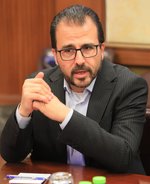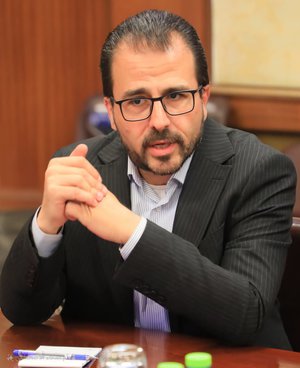Saed K. Khayat
- Nature of Work
- Academic
- Profession
- Director of the Center for Grants and International Projects
- Email Address
- [email protected]
- Office Phone
- (+970) 9 2345113 Ext. 4391


Saed K. Khayat
- Nature of Work
- Academic
- Profession
- Director of the Center for Grants and International Projects
- Email Address
- [email protected]
- Office Phone
- (+970) 9 2345113 Ext. 4391
Prof. Dr. Saed Khayat is a distinguished scholar and academic leader in the fields of water resources management, hydrochemistry, and higher education governance. With over 25 years of experience spanning research, policy development, institutional leadership, and international collaboration, Prof. Khayat has become a key figure in transforming scientific research and higher education systems across Palestine and the Mediterranean region.
He currently serves as the Director of the Grants and Projects Unit at An-Najah National University, where he leads strategic internationalization efforts and research development initiatives. Previously, he served as Vice President for International Cooperation and Dean of Planning and Quality at Palestine Technical University–Kadoorie, and held various national roles at the Ministry of Higher Education.
Prof. Khayat earned his Ph.D. in Hydrochemistry and Isotope Hydrology from the Karlsruhe Institute of Technology (KIT), Germany, and his M.Sc. in Environmental Sciences from An-Najah National University. He also completed two postdoctoral Habilitation fellowships at the Helmholtz Centre for Environmental Research (UFZ) in Germany, where he remains an active guest researcher.
His research interests include climate change and water policy, isotope tracing in hydrology, wastewater treatment and reuse, environmental biotechnology, and higher education innovation. He has published over 50 peer-reviewed papers and book chapters, and supervised numerous graduate theses addressing critical environmental challenges in Palestine and the region.
Prof. Khayat has led and contributed to a wide range of international projects, including Erasmus+, IAEA, OKP, BMBF, and DAAD initiatives. These projects have supported the establishment of early warning systems, capacity-building in WASH and agriculture, and development of virtual education platforms.
A visionary educator and assertive reformer, Prof. Khayat believes in the role of education as a strategic tool for resilience, sovereignty, and transformation. He is known for his disciplined leadership, direct communication, and relentless pursuit of academic excellence and institutional innovation. Through his work, he continues to bridge the gap between research, policy, and practice in higher education under crisis-affected conditions.
Contact Information:
- Phone: +97292671073
- Mobile: +972599868605
- Google Scholar: Prof. Dr. rer. nat. Saed Khayat
- ResearchGate: Saed K. Khayat
- ORCID ID: 0000-0002-3865-4291
- Institution
- Karlsruhe Institute of Technology - KIT
- Country
- Germany
- Degree
- PhD
- Faculty
- Civil Engineering
- Department
- Applied Geosciences
- Thesis
- Hydrogeology and Isotopes Hydrology in the Groundwater from Jordan Valley/ Palestine
- Speciality
- Hydro-geochemist
- Sub speciality
- Isotopes Hydrologist
- Duration
- 2003 - 2006
- Country
- Palestine
- Institution
- Ministry of Higher Education and Scientific Research
- Position/Job Description
- Director of Technical Colleges
- Period
- Jan. 2, 2023 - Jan. 2, 2023
- Country
- Germany
- Institution
- Helmholz Centre for Environmental Researchs-UFZ
- Position/Job Description
- Scientist
- Period
- Jan. 2, 2023 - Jan. 2, 2011
- Country
- Palestine
- Institution
- Palestine Technical University Kadoorie PTUK
- Position/Job Description
- Academic Staff Member/ Professor
- Period
- Jan. 2, 2011 - Jan. 2, 2023
- No Data Available
- No Data Available